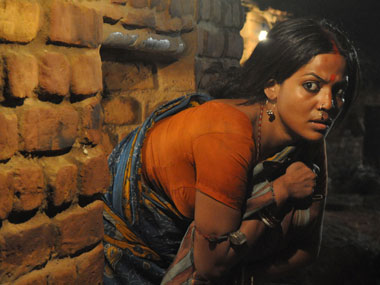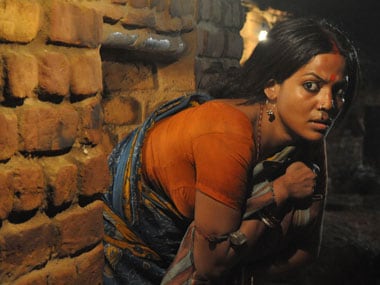Gritty Indian art-house film Gangor sweeps awards in America (original) (raw)
Gangor, which had earlier got a thundering audience reaction in Rome scooped the Best Film, Best Director, Best Actor and Best Actress awards at the New Jersey festival
)
**New York:**Immeasurably aided by a dazzlingly gifted, doggedly disciplined cast, director Italo Spinelli’s explosive film “Gangor” about the police violence and rape of India’s tribal women, won four awards at the “New Jersey Independent South Asian Film Festival."
The festival ran an attractive line-up of 38 South Asian films and was heavily represented by Indian films, as it has been since the event’s 2007 inception. Muzzafar Ali’s critically acclaimed “Anjuman” with Shabana Azmi singing her own songs, was the crowd-pleasing closing night film.
All the movies were satisfying but Italian-Indian co-production “_Gangor_”, which had earlier got a thundering audience reaction in Rome, got tremendous festival play. It scooped the Best Film, Best Director, Best Actor and Best Actress awards at the New Jersey festival. The film made by the Italian director is multi-lingual with English, Bengali and smatterings of Santhali, a dialect spoken by the Santals who live in Jharkhand, Bengal, Orissa, Bihar and Assam.

National School of Drama trained actor Adil Hussain landed the lead role in “_Gangor_” after Irfan Khan backed out of the project at the eleventh hour as he wasn’t able to offer block dates. Hussain, who scooped the Best Actor award in the US for his nuanced portrayal of seasoned photo-journalist Upin, transitioned to “Gangor” with “no time at all to prepare.”
“I auditioned for the movie a year ago and then I never heard from the producers. Later they offered me the newspaper editor’s role in the movie. I said, “Sure, it will be nice to work with Irfan.” Six months later, I got a call from the Indian producer saying can you play Upin instead? I landed the lead role three days before the shoot” Hussain told Firstpost.
“I completely believe that all the roles meant for me will find me,” added Hussain, who has just completed Ang Lee’s adaptation of Yann Martel’s “Life of Pi_” which has a stellar cast that includes French actor Gerard Depardieu. Hussain, an accomplished Delhi stage actor has also acted in “_Kaminay,” “Ishqiya,” “For Real,” and “Agent Vinod.”
“Gangor_” is based on the work of prominent Bengali writer and activist Mahasweta Devi, in particular her short story, “_Behind the Bodice.” By adapting Devi’s work, Spinelli turns the spotlight on the displacement of tribal women and their need to find work in often hostile environments where they are preyed upon by charlatans.
In the film, photo-journalist Upin (Hussain) is sent to Purulia in West Bengal to report on the violence againsttribal women in the impoverished region. There he is struck by the beauty of Gangor (Priyanka Bose) and in a moment of imprudence, he photographs her breast-feeding.
Upin uses one of the pictures for his front-page article decrying the rape and violence against tribal women. The picture triggers a backlash. The movie gets dark as Gangor finds herself shunned by her village for being immodest, hunted by the police and gang-raped. She resorts to life on the streets. Upin, haunted by the hushed-up violence, travels back to Purulia. The people in this movie seem to move freely within it, making choices and mistakes and aware, at every turn, that things could be different.
“Upin trusted, perhaps too naively, that people would empathise with the subject in his picture. His article was about ‘Stop the mass rape against tribal women’ but it triggered a terrible cycle of events he could never have imagined,” said Hussain.
“I forgive him as an actor. He was brave enough to face the consequences. He could have stayed back in Calcutta. But he took the plunge, left his wife behind and went back to Purulia. His intentions were never to harm,” added Hussain. “He paid with his life.”
In a raw, sensitive performance, Bose provides the movie’s guts as Gangor, and the brilliance of her performance lies in her ability to convey both fragility and strength. Her character isn’t just a victim but restores the balance of justice by taking her assailants who are policemen to court. The film’s most cathartic moment is a scene where a group of women surge into the courthouse and strip to support Gangor.
The scene is a tribute to how unafraid Manipuri women are to confront soldiers. In 2004, a group of middle-aged Manipuri women protested against the Armed Forces Special Powers Act (AFSPA) by stripping naked in front of an army barracks in Imphal and unfurling a banner that read: “Indian Army: Rape Us.”
“Gangor is resilient and has an indomitable spirit. Something you do see in India’s tribal women,” said Bose who has acted in “Johnny Gaddar,” “_LSD_” and “_Guzaarish._” The ebullient Mumbai actress shows her acting chops in this movie by transforming into illiterate, but not unintelligent Gangor. Bose won the New Jersey Independent Film Festival award for Best Actress.
Hussain, who is married to Kristen, was drawn to the project as he has spent time in Madhya Pradesh with the Dorua tribals. “I was exposed to tribal life by my teacher Khalid Tyabji who took me to a Dorua village where they haven’t seen cars. There is no concept of money. While living with the Doruas I started appreciating how they look at life, their relationship with nature, with each other. Their customs are way more modern than I thought,” said Hussain who is in New York shooting “English Vinglish.”
Hussain said he wanted “Gangor_” to get a wide release in India: “It is an empowering film dealing with a very real problem. What do awards say? A group of people who understand good cinema appreciated “_Gangor.” It’s great because it reaffirms our conviction that we are on the right track.”
The Indian-Italian co-production shot in 40 days by a primarily Italian crew has certainly found an off-Bollywood niche in the West.